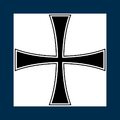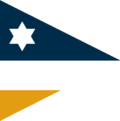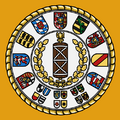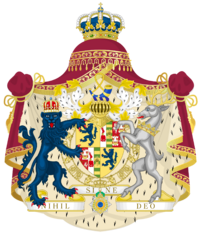Flag of Mascylla
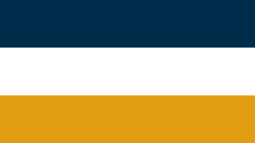 | |
| Name | Reichsbanner und Reichshandelsbanner |
|---|---|
| Use | Civil and state flag, civil ensign |
| Proportion | 1:2 |
| Adopted | 1924 |
| Design | A horizontal tricolour of blue, white, and gold, and a depiction of the national crown with the antler of a deer in the canton |
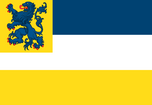 Variant flag of Mascylla | |
| Name | Kriegsbanner |
| Use | Ensign, war flag |
| Proportion | 1:2 |
| Adopted | 1931 |
| Design | A horizontal tricolour of blue, white, and gold, and a depiction of the nation's deer and bear in the canton |
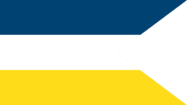 Variant flag of Mascylla | |
| Name | Dienstbanner der See- und Luftstreitkräfte der Reichswehr |
| Use | Naval ensign, naval jack, fin flash |
| Proportion | 1:2 |
| Adopted | 1924 |
| Design | A swallowtail of the ensign without the deer and bear in the canton |
The flag of Mascylla or Mascyllary flag (Hesurian: Maskillische Flagge), often referred to as the Three Bands Flag (Hesurian: Dreibandfahne), is a tricolour flag consisting of three horizontal equally-sized bands displaying the national colours of Mascylla: blue, white, and gold (Hesurian: Blau-Weiß-Gold). The flag was first adopted as the national flag of modern Mascylla after the Mascyllary Revolution, though its main design has been largely attributed to the nation's earlier flag of the Mascyllary Kingdom, excluding a brief interruption in 1923.
While the meaning of the main colours of the flag are not exclusively explained in the any government document, a symbolism was slowly attributed to them. Blue is the traditional color of Aldia as the dirivng force of Mascyllary unification, while they also depict the oceans and rivers. White stands for the purity of the monarchy and its political intent, the people, and the state, and gold, which depicts the colour of the crown and the main colour of the House of Ahnern, which currently rules Mascylla through its sovereign Dorothea I.
Another version which has been widely accepted is that the blue stands for the Elbgau Confederacy, which victoriously fought of Adwhin in the War of the Five Kings to unite Mascylla, hence the smaller and lower stripes of gold and white. However, historians agree upon that King Lukas I personally drafted the earliest version of the flag in the final peace negotiations in Langquaid in 1793. It has since been used as the Mascyllary flag, with a brief interruption of a reversed version of the same colours for the provisional May Republic, which has been used since 1923 until today.
Design and decoration
At the time of the adoption of the flag there were no exact colour specifications other than "the colours of blue, white, and gold", as per Article 15 of the Constitution. However, on 11 May 1993, the High Cout of the Realm introduced a corporate design for the government of Mascylla which defined the specifications of the official colors as the following; the flag's design is formally blazoned as: "Tierced in fess azure, argent and or." As with the design, colours of the flag are only codified and required if produced or used in official capacity by the Mascyllary government. Consequently, other colours can be used for mass-produced versions and reproductions of the flag, and private practice tends to use more saturated colours.
Additionally, the flag may also be decorated with adequate and non-defacing additions, in most cases with golden fringe or trimming. The ceremonial display of the Mascyllary flag includes the use of these enhanced flag versions, particularly in parades, posts and places of honour indoors, and colour guards; all service branches of the Mascyllary Reichswehr use fringed national flags for parades or colour guards, while such additions to a reproduced privately used flag are forbidden.
| Colour scheme | Blue | White | Gold | |||
|---|---|---|---|---|---|---|
| RAL | 5026 Denim blue |
9010 White |
1004 Golden yellow | |||
| HKS | 2.3G 2.9/1.8 | 1, 1, 1 | 1.5Y 2.9/1.1 | |||
| CMYK | 50.0.2.73 | 0.0.0.0 | 0.0.90.14 | |||
| Pantone | 1432 | White | 5442* | |||
| Web color | #131E3A | #FFFFFF | #E29D12 | |||
| Decimal RGB | 16,21,298 | 0,0,0 | 11,182,63 | |||
History, display and use
National flags
| Flag | Date | Use | Description |
|---|---|---|---|
 |
1924 on | The Mascyllary Flag, national flag and civil ensign of Mascylla | A horizontal tricolour of blue, white, and gold |
 |
1924 on | Ceremonial flag of Mascyllary authorities, only permitted for use by authorities and institutions and by the public during national holidays and events | A horizontal tricolour of blue, white, and gold, and a depiction of the national crown with the antler of a deer in the canton |
 |
1928 on | Ensign and war flag (Kriegsbanner) of Mascylla, only permitted for use by the national authorities | Two horizontal fields of blue and white and gold, splitting the second field, with a stylized coat of arms of Mascylla in the canton |
Ensigns
Military flags
| Flag | Date | Use | Description |
|---|---|---|---|
 |
12 July 1797 | Naval ensign, naval jack and fin flash | Swallowtail of the ensign without the deer and bear in the canton |
| 4 October 1802 | Pennant | Horizontal pennant of blue and yellow | |
 |
11 April 1925 | Flag of the Mascyllary Army | Plain blue flag defaced with the Army's crest |
 |
26 March 1955 | Flag of the Mascyllary Air Force | Tricolour of Mascylla in vertical shape on a light blue field, with the Air Force roundel in the light blue |
Standards
| Flag | Date | Use | Description |
|---|---|---|---|
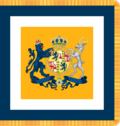 |
Standard of the Prime Minister of Mascylla | 4 November 1966 | A white field encased by a yellow and blue border, defaced with the greater coat of arms of the Government of Mascylla |
 |
Flag of the Imperial Police | 17 July 1998 | A white flag with a blue field on the left third of the flag, with the Imperial Police crest on the white field |
Subnational flags
States and Free Cities
| Flag | Date | Use | Description |
|---|---|---|---|
 |
1793 on | Flag of Adwhin | Horizontal tricolour of red, green and white (from top to bottom) |
 |
1793 on | Flag of Aldia | Two horizontal fields of blue and yellow |
 |
1917 on | Flag of Elpsland | Two horizontal fields of white and red, the coat of arms of Elpsland in the center |
 |
1967 on | Flag of Eustria | Horizontal tricolour of red, yellow and blue (from top to bottom), the coat of arms of Eustria in the center |
| 1871 on | Flag of Falia | Horizontal tricolour of yellow, red and white | |
| 1793 on | Flag of Flussmund | Two horizontal stripes of red and white | |
| 1900 on | Flag of Folnery | Two vertical fields of blue and white, defaced with a double-headed eagle crowned and divided in white and yellow | |
 |
1805 on | Flag of Gotia | Horizontal tricolour of yellow, white and blue, defaced with the coat of arms of Gotia |
| 1793 on | Flag of Halstein | Horizontal tricolour of blue, white and yellow (from top to bottom) | |
 |
1843 on | Flag of Holnia | Two horizontal fields of white and blue, with the coat of arms of Holnia in the first third |
 |
1959 on | Flag of Ihlarn | Vertical tricolour of green, white and black |
 |
1793 on | Flag of Jusland | Horizontal tricolour of blue, white and black (from top to bottom) |
 |
1804 on | Flag of Kreshia | Horizontal tricolour of red, white and red |
 |
1798 on | Flag of the Kronlande | Two horizontal fields of green and yellow |
| 1793 on | Flag of Langquaid | Two horizontal fields of yellow and white | |
| 1866 on | Flag of Laurenz | Horizontal tricolour of red, yellow and black | |
| 1900 on | Flag of Nelgery | Two horizontal fields of white and blue | |
 |
1793 on | Flag of Pereuth | Vertical tricolour of blue, red and white (from left to right), the emblem of Pereuth juxtaposed between the blue and red field |
| 1827 on | Flag of Shwesia | Two horizontal fields of red and yellow | |
 |
1924 on | Flag of Sigismund | Two horizontal fields of yellow and blue, the coat of arms of Sigismund in the left half (central) of the flag |
 |
1801 on | Flag of Terunder-Welsbach | Horizontal tricolour of green, white and red (from top to bottom), the white stripe is divided into an upper white and a lower yellow field |
| File:Flag of Tudonia.png | 1950 on | Flag of Tudonia | Horizontal tricolour of red, white and blue (from top to bottom) |
Historical flags
Elbgau Confederacy (1757–1793)
Mascyllary Kingdom (1793–1923)
